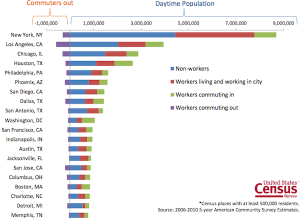For people in America, it is not uncommon for people to commute to work. This is often because people who work in a city do not always live there, but rather they live in the suburbs surrounding the city and commute to work. Stats from the 2010 census showed the top 20 cities with the highest commuter day time population, with Manhattan coming in at number one, with more than 3 million people who commute in from the suburbs for work. Since mass transit is such a big part of so many Americans’ lives, why don’t we like it?
Authors Bruno S. Frey and and Alois Stutzer did a meta-analysis of many commuter studies, and found that many say they commute to work because the housing market is better outside of the city, or because the workload or income given at their inner-city job is worth the stress of the commute. However, when the commuters were actually studied, Frey and Stutzer discovered something that they coined the “commuter paradox”. This paradox showcases that the longer someone commutes to work, the lower they report their well-being to be.
Frey and Stutzer found that commuting is the number one common daily activity that causes stress. They say that most of this stress comes from the out-of-pocket costs provided by commuting and the amount of time spent on the go (time that could have been spent relaxing or spending time with family). According to CNN Money, those who commute to work spend an average of 200 hours traveling per year, as well as $2,600 in traveling expenses.
This extra stress caused by commuting could be caused by the pollution in the air, the noise level involved in being on the road, in the subway, or another mobile form. Another big stress that many commuters experience is the fact that many commuters can’t control when their ride is coming (such as a subway rider, a bus taker, and the like).
These types of anxieties can lead to high blood pressure, anger, and musculosketal disorders (the inflaming of the muscles in the limbs, neck, and back). Issues like these can result in estranged relations, which can lead to even more health problems.
Only 31% of working commuters have claimed that they do not experience any health problems when it comes to their commute. With such a small number of people not be affected by this, it is something that most people should take into consideration before purchasing a home away from their work.


Pingback: Not Sure If A New House Is Right For You? Check Out These Pros And Cons Of Moving -
I can relate to this blog as a student on such a big campus, as can my fellow classmates. This blog really got me thinking about how commuting really has an impact on a person’s day and overall well-being. I know that when I rush or”commute” to my 9am class in the cold, my mood tends to worsen and my thighs begin to burn. That being said, I decided to research how commuting affects people health and its correlation with health risks. After a plethora of meta-analyses were completed by a vast range of researchers, many elevated risks for body weight and blood pressure were found as the distances of commuting were increased. A Swedish study revealed that a person commuting over 30 miles a day tended to have high blood pressure (these results were found but may be due to chance). Which such a vast array of studies, it seems the null hypothesis has been rejected by many studies (as it would be that commuting is not detrimental to people’s health).
http://well.blogs.nytimes.com/2013/10/28/commutings-hidden-cost/?_r=0
I can relate to this blog as a student on such a big campus, as can my fellow classmates. This blog really got me thinking about how commuting really has an impact on a person’s day and overall well-being. I know that when I rush or”commute” to my 9am class in the cold, my mood tends to worsen and my thighs begin to burn. That being said, I decided to research how commuting affects people health and its correlation with health risks. After a plethora of meta-analyses were completed by a vast range of researchers, many elevated risks for body weight, waist circumference, and blood pressure rose were found as the distances of commuting were increased. A Swedish study revealed that a person commuting over 30 miles a day tended to have high blood pressure (these results were found but may be due to chance). Which such a vast array of studies, it seems the null hypothesis has been rejected by many studies (as it would be that commuting is not detrimental to people’s health).
http://www.ajpmonline.org/article/S0749-3797%2812%2900167-5/abstract
http://well.blogs.nytimes.com/2013/10/28/commutings-hidden-cost/?_r=0
Even though I do not really have a “commute” per se as a college student (one can’t really count those 15 minute walks to 8 A.M. classes can they!) my personal view on society’s frustration with commuting comes less from injury than it does time. While not proven in any study, I think the major cause of irritation is all the other things one could be doing with their time. This may be too philosophical, but we only have a certain amount of hours in our lives, and to lose a couple each week doing nothing but going in one direction and then back the other would certainly drive me crazy. Of all the things to do, driving to work or going on a train isn’t what most people would choose, and is my opinion on why commuting sucks.